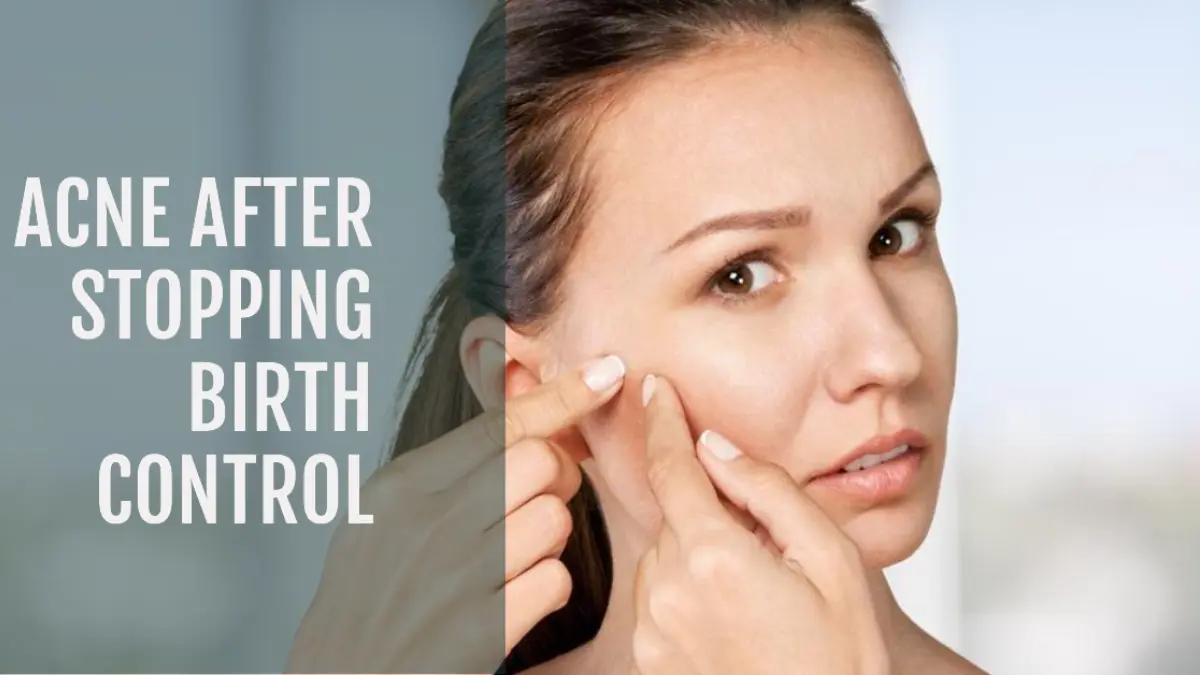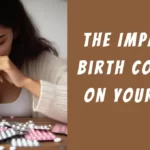
Acne is a common skin condition that affects many individuals, and it can be particularly frustrating when it appears after stopping birth control. While birth control pills are often prescribed to manage acne, some individuals may notice an increase in acne breakouts once they discontinue using them. In this article, we will explore the causes, treatment options, and prevention strategies for acne after stopping birth control.
Related: How Long Does It Take To Lose Weight After Stopping Birth Control?
Acne after Stopping Birth Control
Acne after stopping birth control is a common concern among individuals who have experienced improvements in their acne while using oral contraceptives. The sudden appearance or worsening of acne can be distressing, but understanding the underlying causes and available treatment options can help manage the condition effectively.
When birth control is discontinued, hormonal changes occur within the body, which can lead to an increase in acne breakouts. The exact mechanism behind this is not fully understood, but it is believed that the withdrawal of synthetic hormones disrupts the balance of natural hormones, triggering acne formation.
What Causes Acne after Stopping Birth Control?
Hormonal Changes
Discontinuing birth control pills can result in hormonal imbalances, specifically a rise in androgen levels. Androgens stimulate the sebaceous glands, leading to increased sebum production and clogged pores, which can contribute to acne breakouts.
Increased Sebum Production
Sebum is an oily substance produced by the sebaceous glands in the skin. When there is an excess of sebum production, it can combine with dead skin cells and bacteria, leading to the formation of acne.
Imbalance of Bacteria on the Skin
The skin naturally contains a balance of good and bad bacteria. Disrupting this balance can result in the overgrowth of harmful bacteria, such as Propionibacterium acnes, which is associated with acne development.
Related: How to Get Birth Control Online? (Detailed Review 2023)
Understanding the Connection between Hormones and Acne
Hormonal fluctuations play a significant role in the development of acne, and birth control pills can help regulate hormone levels to manage the condition. Estrogen and progesterone, the hormones present in most oral contraceptives, can reduce sebum production and decrease the likelihood of acne breakouts. However, when birth control is discontinued, hormonal imbalances may occur, leading to acne flare-ups.
Treatment Options for Acne after Stopping Birth Control
If you’re experiencing acne after stopping birth control, there are several treatment options available to help manage and reduce breakouts. It’s important to note that treatment effectiveness can vary depending on individual factors, so consulting a dermatologist is recommended for personalized advice.
Topical Treatments for Post-Birth Control Acne
Benzoyl Peroxide
This over-the-counter medication called benzoyl peroxide can effectively kill acne-causing bacteria and reduce inflammation. It is available in various strengths and formulations, such as gels, creams, and cleansers.
Retinoids
These vitamin A derivatives called retinoids are known for their ability to unclog pores, promote cell turnover, and reduce inflammation. Both prescription-strength retinoids and over-the-counter retinol products can be beneficial in managing acne.
Salicylic Acid
This beta-hydroxy acid called salicylic acid exfoliates the skin, unclogs pores, and reduces inflammation. It is commonly found in acne treatment products like cleansers, toners, and spot treatments.
Oral Medications for Acne Management
In some cases, dermatologists may prescribe oral medications to treat acne after stopping birth control. These medications are typically used for moderate to severe acne and may include:
Antibiotics
Oral antibiotics, such as tetracycline or doxycycline, are often prescribed to control acne-causing bacteria and reduce inflammation.
Spironolactone
This medication called spironolactone primarily used to treat hormonal acne works by reducing androgen levels in the body, thus decreasing sebum production and preventing acne formation.
Oral Contraceptives
In certain instances, your dermatologist may recommend switching to a different type of birth control pill that is specifically approved for managing acne. These pills contain a combination of estrogen and a specific progestin that can help regulate hormone levels and reduce acne.
Related: When to Stop Birth Control Pills Before Pregnancy?
Lifestyle Changes to Reduce Acne Breakouts
Alongside medical treatments, making certain lifestyle changes can have a positive impact on managing acne after stopping birth control. Consider incorporating the following habits into your routine:
Proper Skincare Routine
Cleanse your face twice daily with a gentle cleanser to remove excess oil and impurities. Avoid harsh scrubbing, as it can irritate the skin and worsen acne. Use non-comedogenic moisturizers and sunscreen to protect and nourish your skin.
Diet and Acne
Although research on the link between diet and acne is inconclusive, some studies suggest that a low-glycemic diet, rich in fruits, vegetables, and whole grains, may help reduce acne. Limiting dairy and sugary foods might also be beneficial for some individuals.
Stress Management
Stress can contribute to hormonal imbalances and worsen acne. Engage in stress-reducing activities like exercise, meditation, and hobbies to help manage stress levels.
Prevention Strategies for Acne after Stopping Birth Control
While it may not be possible to completely prevent acne after stopping birth control, there are certain strategies you can implement to reduce the likelihood of breakouts and promote clearer skin:
Gradually Transitioning Off Birth Control
If you’re considering discontinuing birth control, talk to your healthcare provider about gradually reducing the dosage or switching to a different form of contraception. This can help minimize the hormonal fluctuations that may trigger acne.
Maintaining a Regular Skincare Routine
Stick to a consistent skincare routine that includes gentle cleansing, moisturizing, and protection from the sun. Avoid harsh scrubs or abrasive products that can irritate the skin and potentially worsen acne.
Identifying and Avoiding Trigger Factors
Pay attention to factors that may exacerbate your acne, such as certain skincare products, cosmetics, or dietary choices. If you notice a correlation between specific triggers and breakouts, try to eliminate or minimize exposure to those triggers.
Managing Stress Levels
Stress can contribute to hormonal imbalances and worsen acne. Engaging in stress-reducing activities, such as exercise, meditation, or hobbies, can help alleviate stress and promote clearer skin.
Avoiding Excessive Touching or Picking
Touching your face frequently or picking at acne lesions can introduce bacteria and worsen inflammation. Practice good hygiene by keeping your hands clean and refraining from touching your face unnecessarily.
Consulting a Dermatologist
If over-the-counter treatments and lifestyle changes do not effectively manage your acne, it may be beneficial to seek professional help. A dermatologist can assess your specific situation and provide personalized recommendations and treatments tailored to your needs.
Related: What are the Chances of Getting Pregnant after Stopping Birth Control?
Conclusion
Acne after stopping birth control is a common concern for many individuals. The hormonal changes that occur when discontinuing oral contraceptives can lead to acne flare-ups and breakouts. However, with the right treatment and lifestyle adjustments, it is possible to manage and reduce post-birth control acne effectively.
Related: 30 Pregnancy Myths: Separating Fact from Fiction
Frequently Asked Questions (FAQs)
Can Birth Control actually cause Acne?
Birth control pills are often prescribed to manage acne, but some individuals may experience acne flare-ups when they discontinue using them. This can be attributed to hormonal changes that occur after stopping birth control.
Will my Acne worsen immediately after stopping Birth Control?
Acne can worsen in the weeks or months following the discontinuation of birth control. It may take some time for the body to adjust to the hormonal changes, resulting in temporary acne breakouts.
How long does Acne last after stopping Birth Control?
The duration of acne after stopping birth control varies from person to person. For some individuals, acne may resolve on its own within a few months, while others may experience prolonged acne flare-ups. Consulting a dermatologist can help determine the best course of action for your specific case.
Are there any Natural Remedies for Post-Birth Control Acne?
Natural remedies such as tea tree oil, witch hazel, or green tea extract may have anti-inflammatory and antimicrobial properties that can help reduce acne. However, it’s important to note that these remedies may not be as effective as medical treatments, and consulting a dermatologist is advisable for severe or persistent acne.
Should I consider going back on Birth Control to manage my Acne?
Going back on birth control solely for the purpose of managing acne should be discussed with your healthcare provider. They can evaluate your individual situation and provide guidance on whether it is a suitable option for you.
When should I consult a Dermatologist for my Acne?
If over-the-counter treatments and lifestyle changes are not effectively managing your acne, or if your acne is severe, persistent, or causing emotional distress, it is advisable to consult a dermatologist. They can assess your condition, provide a proper diagnosis, and recommend appropriate treatment options.












